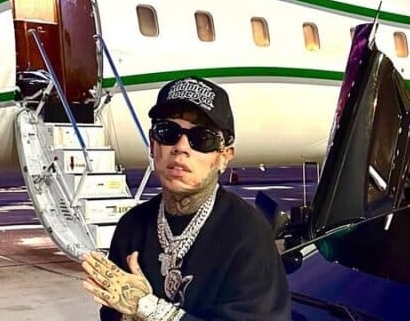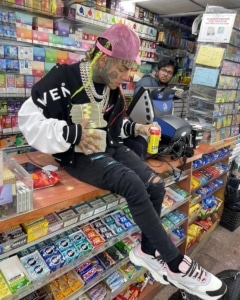Tekashi 6ix9ine & DJ Vlad Clash Over Young Thug’s Peace with YFN Lucci — Forgiveness or Foolishness? (Part 8)
Los Angeles, CA — Another day, another viral VladTV moment — and this one might be the most explosive of the year.
In Part 8 of DJ Vlad’s ongoing sit-down with Tekashi 6ix9ine, what began as a routine conversation about hip-hop headlines spiraled into a full-blown moral standoff about loyalty, revenge, forgiveness, and survival in the streets.
The topic? Young Thug and YFN Lucci reportedly ending their long-running beef.
The moment? A flashpoint that peeled back the layers of pain and principle running through modern hip-hop culture.
And in classic Tekashi fashion — it didn’t take long before the conversation turned into something far deeper than music.
🎬 The Setup: Calm Before the Fire
The clip opens in familiar VladTV style: dimly lit room, two chairs, two cameras, tension so thick you could cut it.
Vlad leans forward, speaking slowly, almost like a teacher breaking down a lesson.
“At some point,” he says, “somebody has to be the adult in the room. Otherwise, the children will continue to kill each other.”
He’s talking about Thug and Lucci, two Atlanta figures whose feud once stretched beyond music — into real violence, real loss.
It’s a moment Vlad sees as progress, a small glimpse of maturity in a genre often criticized for glorifying beef.
But Tekashi’s face tightens.
He shakes his head before Vlad even finishes the sentence.
“If somebody shot at your mother, Vlad, would you be in the club with them? You gonna dap ‘em up? Party next to ‘em?”
The studio goes quiet.
Vlad pauses — not because he doesn’t have an answer, but because Tekashi just hit a nerve the internet would spend the next 48 hours dissecting.
🔥 The Clash: Morals, Loyalty, and Street Codes
Vlad tries to hold his composure, pushing back gently.
He argues that forgiveness isn’t about weakness — it’s about ending cycles that have already taken too many lives.
“Look, it’s not about being friends,” Vlad says. “It’s about putting an end to something that’s claimed enough people already. How long do we want the next generation to keep dying for the same things?”
But Tekashi, pacing slightly in his chair, doesn’t flinch. His voice rises, raw with conviction.
“You saying that ‘cause you never lost nobody like that. If someone took a piece of your family, if you had to watch your people die, you wouldn’t be preaching forgiveness. You’d be talking about payback.”
For a split second, it’s not an interview anymore — it’s therapy disguised as conflict.
Vlad brings up the concept of growth. Tekashi brings up pain.
Vlad speaks of peace. Tekashi speaks of principle.
And somewhere in between those two words lies the entire history of hip-hop — a culture born from struggle, trying to figure out how to evolve without losing its authenticity.
⚖️ The Philosophy of Peace: Vlad’s Argument
To Vlad, Young Thug and YFN Lucci’s truce symbolizes something revolutionary — a break in the cycle.
He compares it to war and reconciliation on a global scale.
“You know, after World War II, the U.S. and Japan made peace. They bombed each other, killed thousands, and still moved forward for the greater good. It’s not about forgetting what happened — it’s about not letting it destroy the future.”
It’s an analogy that makes sense in theory — but lands like a grenade in the interview.
Tekashi laughs in disbelief.
He leans back, throws his arms up.
“So you’re comparing Young Thug to a nation, Vlad? To Hiroshima? You can’t compare real street pain to politics. People died in this, man. Families hurt. Ain’t no treaty gonna fix that.”
That’s when the internet lost it.
The clip — just 90 seconds of exchange — spread like wildfire across TikTok, YouTube Shorts, and X (Twitter).
Within hours, fans were stitching, quoting, and debating every word.
Some called Tekashi “real for standing on morals.”
Others said Vlad was “preaching peace and maturity.”
The divide wasn’t about who was right — it was about what kind of world hip-hop wants to live in now.

💔 Beyond the Argument: The Ghosts in Tekashi’s Voice
Underneath the bravado, there’s something raw about Tekashi’s tone.
When he talks about betrayal and loss, it’s not theory — it’s memory.
He brings up his own past — the years of controversy, the headlines, the betrayals that left him branded as one of the most polarizing figures in hip-hop.
“Everybody wanna talk about ‘growth,’” he says, “but when I tried to grow, they laughed. When I tried to rebuild, they called me a rat. I had to fight for everything I got back. It wasn’t grace that brought me back. It was me.”
That’s when you realize — Tekashi isn’t really talking about Thug and Lucci anymore.
He’s talking about what it means to come back from being hated, exiled, and misunderstood.
To him, “growth” isn’t forgiveness — it’s resilience.
It’s surviving when everyone hopes you won’t.
Vlad nods slowly, recognizing the vulnerability beneath the fury.
For a moment, both men stop arguing — and start listening.
💬 The Internet Reacts: Two Sides of the Same Coin
When the clip hit social media, it didn’t just trend — it exploded.
The hashtags #Tekashi6ix9ine, #DJVlad, #YoungThug, and #Lucci dominated trending lists for 48 hours.
Fans and creators posted reaction videos breaking down every line.
Podcasters debated whether Tekashi was “defending morals” or “justifying ego.”
YouTubers edited cinematic recaps with the headline: “Forgiveness or Foolishness?”
One fan on X summed it up:
“Vlad’s preaching peace like a pastor. Tekashi’s speaking pain like a survivor. Both right. Both broken.”
And maybe that’s what made the clip hit so hard — it wasn’t about who “won.” It was about watching two worldviews crash into each other and realizing they both came from trauma.
🧩 The Bigger Story: Forgiveness in Hip-Hop
In the larger picture, this wasn’t just a debate between two personalities — it was a reflection of the maturity crisis in hip-hop.
For decades, the culture has wrestled with how to evolve beyond violence without losing credibility.
From Biggie and Tupac to Drill music and the new wave of Atlanta, every generation faces the same question:
Can you grow without being called soft?
Can you forgive without looking fake?
When Nipsey Hussle died, the world saw what peace could look like — a man who stood on principle but still built bridges.
When Thug and Lucci decided to move past their feud, some called it honorable. Others called it betrayal.
And now, through Vlad and Tekashi, the debate lives on — louder, rawer, and more necessary than ever.
🕊️ The Duality: Pain vs. Progress
For Tekashi, the streets don’t forgive — they remember.
Forgiveness, in his eyes, can feel like erasing the people who died behind the war.
“You can’t just shake hands and say it’s over,” he says. “The people gone don’t get to do that.”
For Vlad, forgiveness isn’t surrender — it’s survival.
He believes the next generation can’t keep paying for yesterday’s pride.
“At some point,” he says quietly, “we gotta stop letting our trauma decide who lives and who dies.”
That single line turned into the quote of the episode — reposted across thousands of hip-hop pages.
🧠 Cultural Reflection: When Hip-Hop Grows Up
Every era in hip-hop has its defining moments —
moments that force the culture to look at itself differently.
From Jay-Z shaking Nas’s hand on stage, to Drake and Meek Mill squashing their feud, to now — Thug and Lucci’s truce.
The question is no longer just about who’s real.
It’s about who’s evolving.
Hip-hop is aging. Its stars are fathers now. Businessmen. Icons.
The same culture that once glorified retaliation is now learning the language of restoration — even if that language sounds uncomfortable.
And in that sense, both Vlad and Tekashi represent two sides of the same coin:
The one who believes healing must come first, and the one who believes wounds don’t close without truth.
🎙️ Final Words: The Power of Conversation
By the end of Part 8, the tone softens.
Tekashi exhales. Vlad leans back. Both men are still divided — but respectful.
There’s no handshake, no perfect resolution.
Just silence — the kind that only comes after something real has been said.
The camera fades out, but the echo lingers:
“When the streets finally grow up… does forgiveness mean weakness — or wisdom?”
It’s the kind of question that doesn’t need an answer — because it lives in the tension between survival and peace.
📢 Conclusion: The Conversation We Needed
In the end, no one “won” the argument.
But hip-hop did.
Because for once, two voices — both flawed, both human — took the conversation deeper than gossip or clicks.
They talked about legacy, about what happens when pain becomes tradition, and about the price of letting ego outrun empathy.
Maybe that’s the real story here.
Not who’s right — but who’s still brave enough to talk about it.
👉 Stay connected for the latest hip hop and streaming news at The Urban Spotlight Homepage
👉 For more background on Floyd Mayweather’s career and empire, check out his Wikipedia page







Leave a Reply
Want to join the discussion?Feel free to contribute!